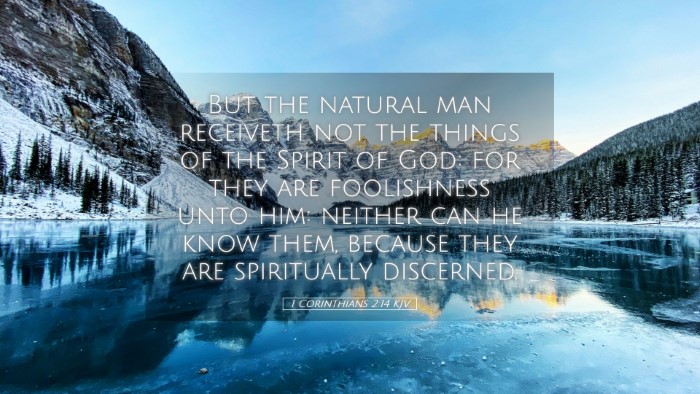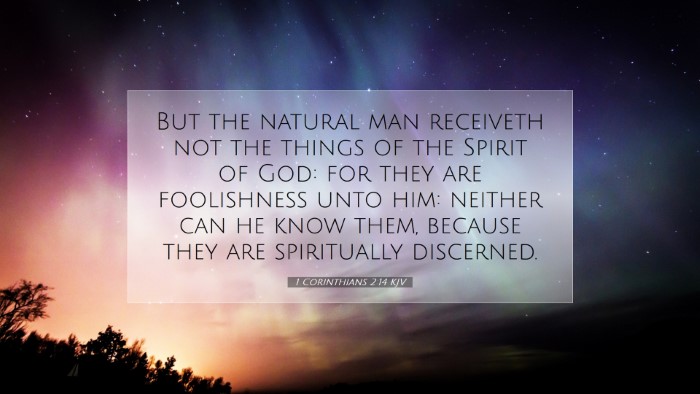Commentary on 1 Corinthians 2:14
Bible Verse: "But the natural man receiveth not the things of the Spirit of God: for they are foolishness unto him: neither can he know them, because they are spiritually discerned." (1 Corinthians 2:14, KJV)
Introduction
This passage from 1 Corinthians addresses the profound distinction between the spiritual understanding of those who are guided by the Holy Spirit and the natural comprehension of those who are solely reliant on human wisdom. Paul highlights the essence of spiritual discernment in relation to the knowledge of God, proposing that the insight offered by the Holy Spirit is essential to grasp the deeper truths of the faith.
Insights from Matthew Henry
Matthew Henry expounds upon the notion of the "natural man," depicting him as one who is devoid of spiritual insight. According to Henry, the wisdom of the world stands in stark contrast to the wisdom of God, as the former cannot comprehend the latter. He points out that the things of the Spirit are seen as foolishness to those not transformed by grace; thus, the willingness to receive divine wisdom is essential for understanding spiritual truths.
- Natural Understanding: Henry emphasizes that without the Holy Spirit, an individual is blind to the things that are of God. The natural person operates under the limitations of human reasoning, relying solely on tangible evidence rather than spiritual truth.
- Spiritual Insight: He argues that true insight into divinely revealed truths requires the work of the Spirit. The natural man may engage in intellectual pursuits, yet this knowledge lacks the divine foundation necessary for true understanding.
Insights from Albert Barnes
Albert Barnes provides an analytical view of Paul’s assertion regarding the "natural man.” Barnes asserts that this term encompasses all unregenerated humanity, who lack the spiritual enlightenment necessary to comprehend divine revelations. He highlights the intrinsic limitations of human understanding when it comes to grasping sacred truths.
- Foolishness of God’s Wisdom: Barnes notes that to the unregenerated mind, the doctrines of the Gospel appear unreasonable. This foolishness stems from the absence of spiritual insight—without it, profound truths are dismissed and misunderstood.
- Spiritual Discernment: He elucidates the notion that spiritual matters require judiciousness and insight that are beyond human capability. The things of God are discerned through the Holy Spirit, who enlightens and reveals truths that would otherwise remain hidden.
Insights from Adam Clarke
Adam Clarke’s commentary builds upon the interaction between the natural and spiritual realms. He explains that the "natural man," or the unconverted individual, owns an insatiable curiosity yet remains imprisoned by his conditions, unable to encounter the full breadth of divine reality.
- The Role of the Holy Spirit: Clarke emphasizes that it is through the Holy Spirit that individuals gain a true knowledge of God. He asserts that spiritual understanding is not innate but rather bestowed upon believers who earnestly seek it.
- The Contrast of Worldly Wisdom and Divine Truth: Clarke contrasts worldly wisdom with divine enlightenment, reiterating that human cognition cannot reach the heights of spiritual knowledge without the intervention of the Holy Spirit, highlighting the need for a transformational experience.
Theological Implications
The theological implications of 1 Corinthians 2:14 are significant for understanding the nature of revelation and the work of the Holy Spirit. This passage challenges intellectual assumptions and calls for a humility in approaching Scripture and the mysteries of faith.
- Dependence on Divine Revelation: The verse underscores the necessity of relying on God’s revelation through the Spirit rather than human wisdom to perceive spiritual truths.
- The Nature of Salvation: Recognizing that salvation encompasses not just an intellectual acknowledgment of truth but a spiritual awakening implies a need for a divine act of grace.
- Encouragement for Evangelism: Understanding that many may not resonate with the Gospel message at first invites believers to pursue prayer and dependence on the Holy Spirit in evangelism.
Conclusion
1 Corinthians 2:14 serves as a profound reminder of the necessity for spiritual discernment in the life of the believer. It emphasizes that understanding God’s truths transcends mere intellectual capability and is fundamentally rooted in a relationship with the Holy Spirit. The insights from Matthew Henry, Albert Barnes, and Adam Clarke collectively stress the critical nature of spiritual revelation, calling both scholars and laypeople to seek a deepened awareness of the divine through the power of the Holy Spirit.


